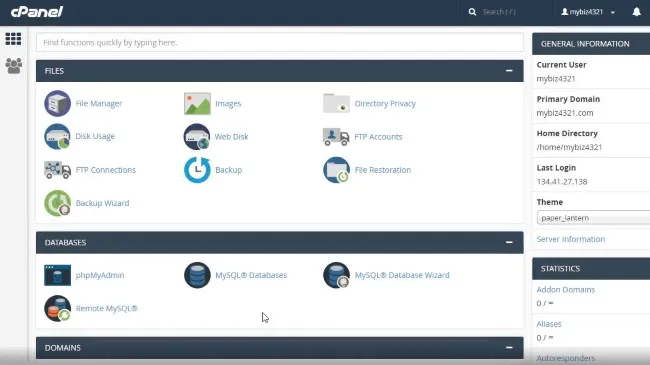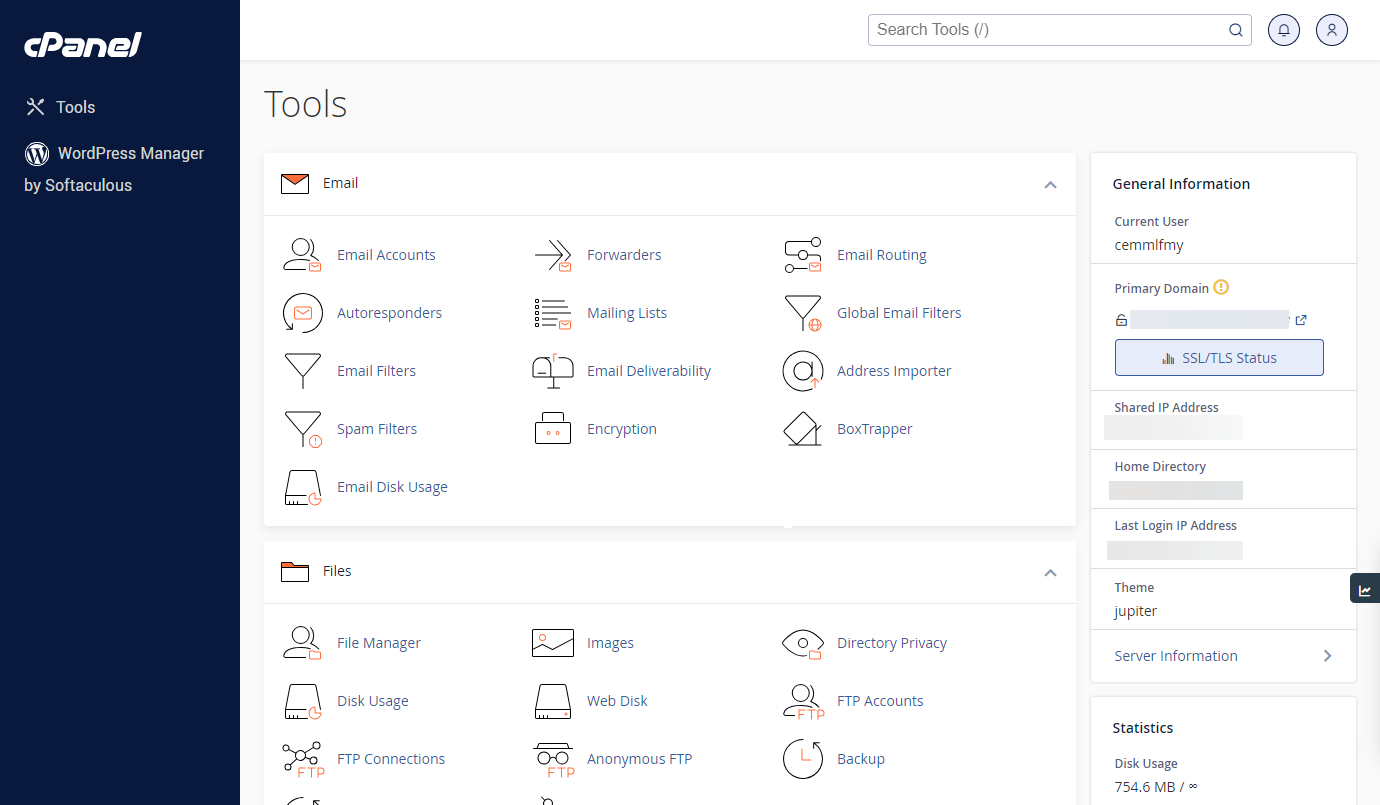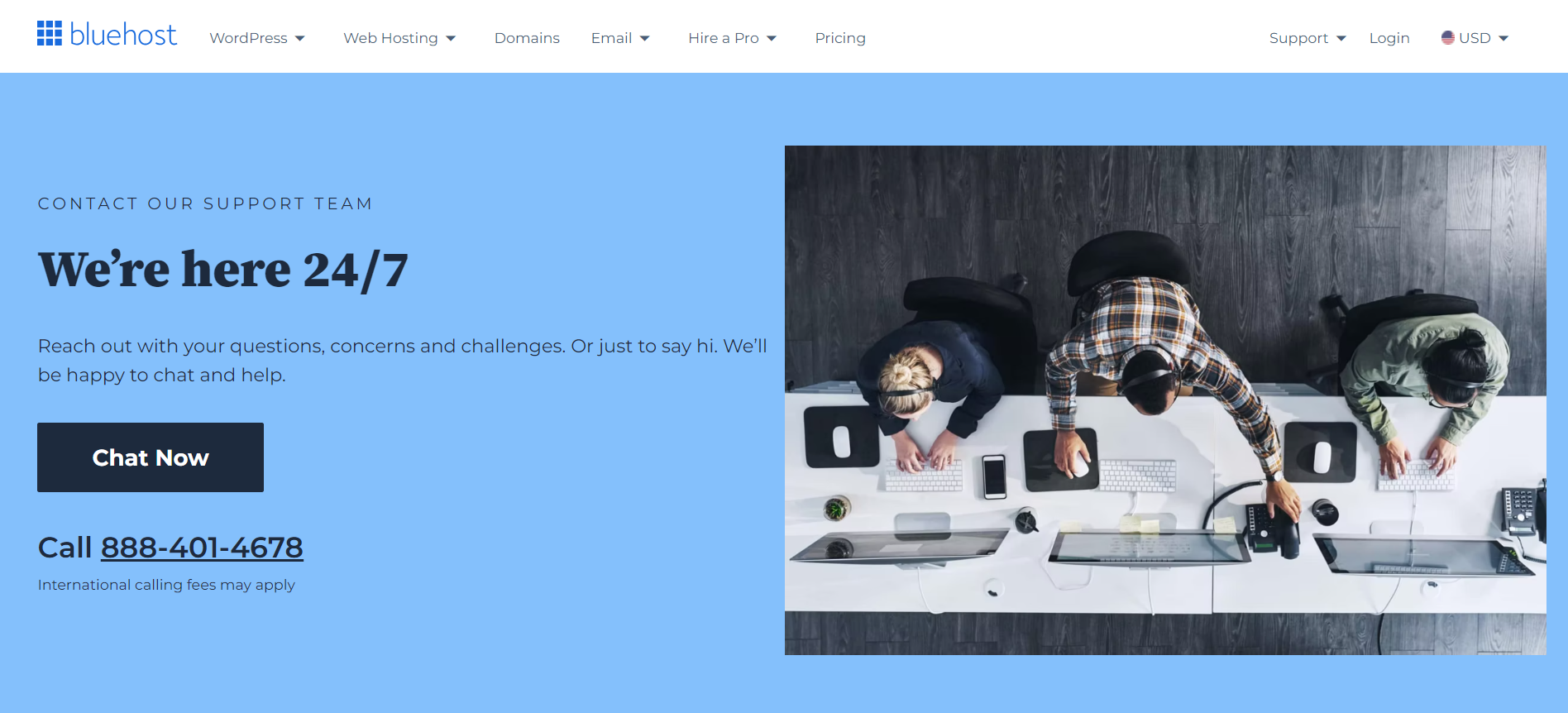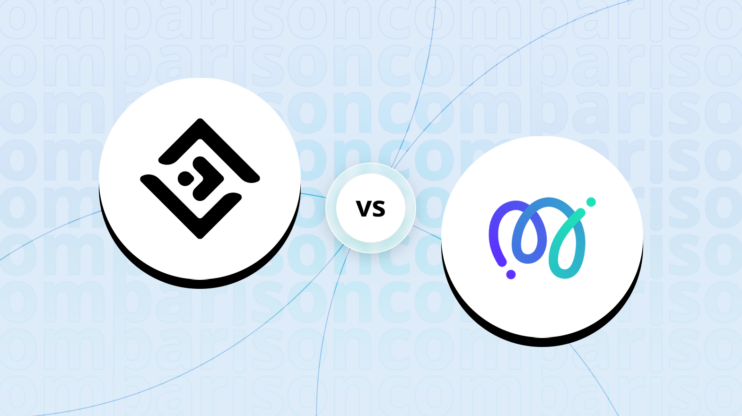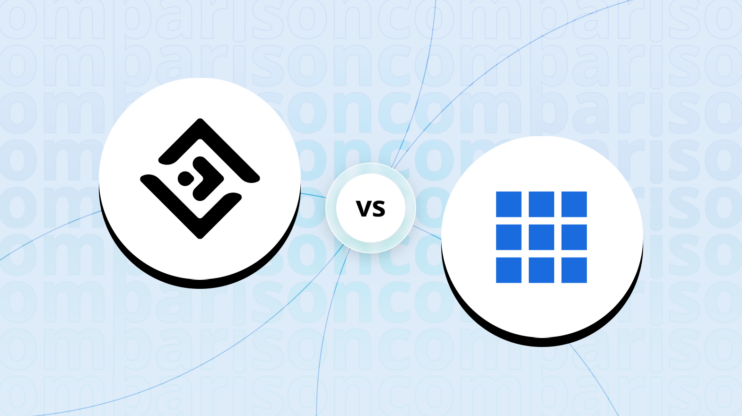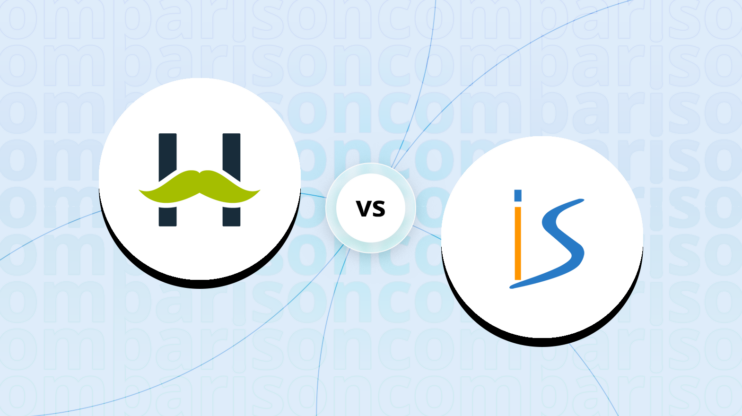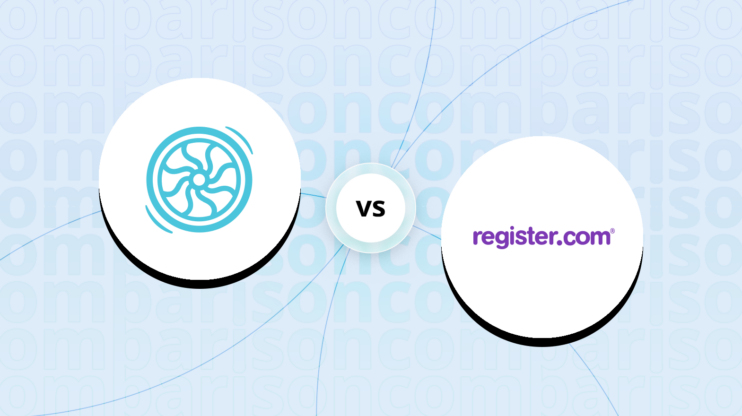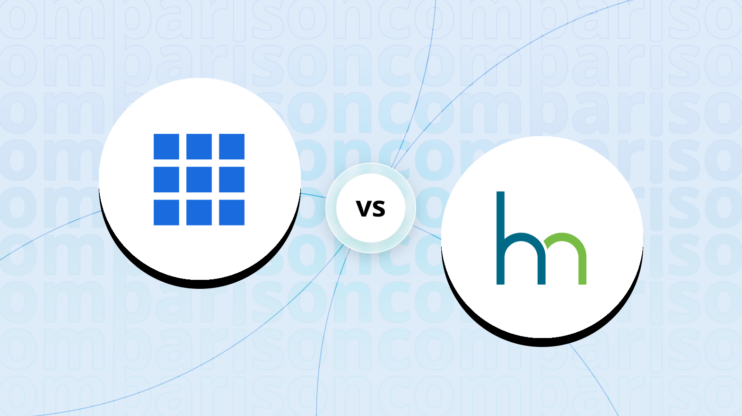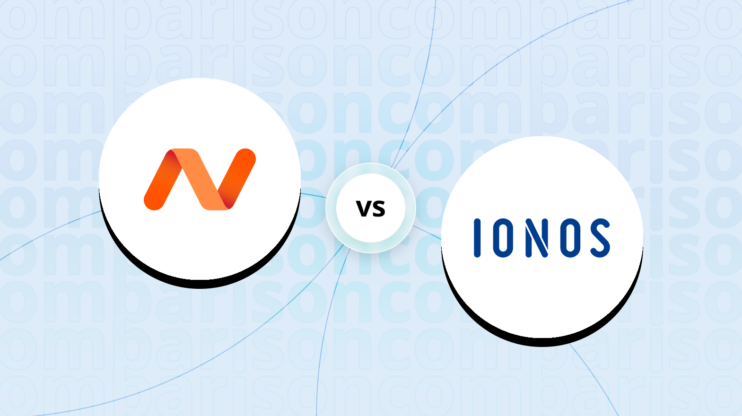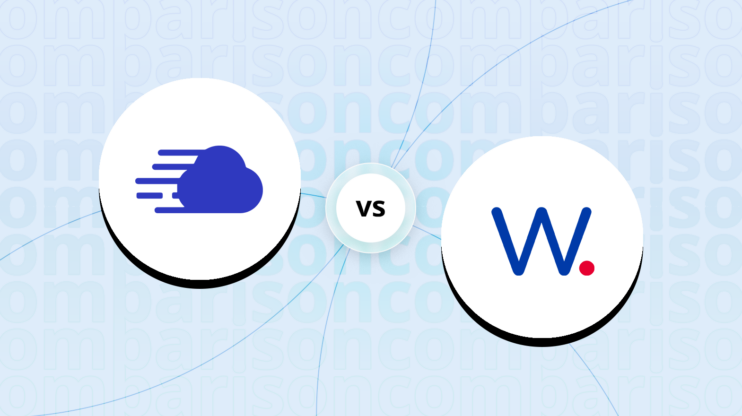Final verdict
Looking over Bluehost vs. Mochahost, each has its strengths and caters to different needs, resulting in a balanced competition.
-
Bluehost (Overall grade: 8.2)
offers a diverse range of hosting options, making it ideal for users seeking flexibility and scalability. Its key strengths include impressive uptime, reliable performance, and specialized WordPress hosting endorsed by WordPress.org. The integration of AI WonderSuite tools and a familiar cPanel interface significantly enhances user experience, especially for beginners. Additionally, Bluehost’s transparent pricing, starting with free domains and SSL for the first year, makes it a cost-effective option for new websites. However, some users have reported inconsistent customer support experiences and surprise fees, which could be a drawback for those requiring steady assistance.
-
Mochahost (Overall grade: 8.2)
stands out with its managed VPS and dedicated hosting solutions, appealing to users with high-traffic or multimedia-rich websites. The platform’s use of high-speed NVMe storage, carbon-neutral hosting, and 99.95% uptime guarantee ensures robust performance and environmental responsibility. It also offers strong security measures with free SSL certificates and anti-virus protection, making it a secure choice for e-commerce and professional sites. Mochahost’s no-hidden-fees policy and superior customer support, highlighted by quick response times and expertise, provide reassurance to users. However, the lack of explicit pricing details and occasional reports of slower issue resolution may present challenges for potential customers.
 Overall grade:8.2 |
 Overall grade:8.2 |
|
|---|---|---|
| Uptime and Availability | 9.0 | 8.9 |
| Hosting Performance | 8.9 | 8.0 |
| Hosting Security | 8.1 | 8.6 |
| Price | 8.1 | 6.8 |
| Hosting Features | 7.0 | 7.5 |
| Ease Of Setup | 8.6 | 8.8 |
| User Management | 8.0 | 8.5 |
| Customer Support | 7.9 | 8.6 |
| User feedback | 3.5/5 | 4.1/5 |
Hosting types offered
Both platforms provide a variety of hosting types, each designed to meet the different needs of users.
 |
 |
|
|---|---|---|
| Shared hosting | ||
| Cloud hosting | ||
| WordPress hosting | ||
| Ecommerce hosting | ||
| VPS hosting | ||
| Dedicated hosting |
Although both offer a variety of hosting plans tailored to different needs, in
certain cases, one platform may prove to be more suitable.
features, making it a better choice for businesses prioritizing long-term growth and stability in their ecommerce endeavors.
Detailed comparison
Uptime and availability
Evaluates the average uptime statistics, uptime guarantee and overall availability of the hosting
provider
Score Components:
- Uptime percentage (30%): evaluates the uptime statistics in given period of time
- Uptime guarantee (20%): Assesses if the platform offers an uptime guarantee and
whether the actual uptime matches the promised guarantee. - General performance (25%): Evaluates how fast is the average response time and overall
it’s stability. - Responsiveness (10%): Adaptability to different devices and screen sizes.
- Availability (25%): Reflects the total downtime and number of outages.
 9.0
9.0
 8.9
8.9
Section 1:
🏆 Winner
Bluehost: Strong uptime and reliable performance.

Bluehost demonstrates impressive uptime, often achieving near-perfect percentages. Their server response time is generally good, able to handle traffic spikes effectively. Additionally, they offer a strong SLA with compensations for downtime.

Mochahost offers attractive features like carbon-neutral hosting and a global data center presence. They guarantee 99.9% uptime and provide compensation for downtime. Customer reviews highlight reliable service and professional support. Despite these strengths, Bluehost slightly edges out in terms of overall performance and reliability.
Hosting performance
Score Components:
- Hosting speed (30%): This includes SSD quality, Load times, PageSpeed score ranges,
additional information on website speed, built-in plugins for performance enhancement, available caching
methods, and CPU/RAM options - CDN (20%): Considers whether CDN is available or not, whether it’s free or paid, and
the quality of the CDN service - Available data centers (30%): Evaluates the number of data centers and their locations
globally. - Scalibility (20%): Looks at whether elastic scaling is available, the process required
to scale (manual upgrade vs. automatic scaling), the presence of dedicated servers, and the costs
associated with scaling.
 8.9
8.9
 8.0
8.0
🏆 Winner: Bluehost: Recommended by WordPress.org, trusted by over 2 million users.
Both Bluehost and Mochahost offer competitive hosting performance, but there are key differences between the two. Bluehost is known for its incredible site speed, thanks to SSD storage and advanced CDN integration in all plans. It maintains 100% network uptime for cloud hosting, boasts multiple global data centers, and uses scalable CPU and PHP workers. Mochahost is no slouch either, featuring SSD and NVMe SSD storage, high-speed 1Gbit/s network connections, and AMD EPYC CPUs. While it guarantees 99.95% uptime, it also provides elastic hosting environments. Mochahost includes free SSL certificates and advanced security features.
Website Speed
Bluehost is designed for high-speed performance with SSD storage, built-in CDN, and highly optimized infrastructure. This combination reduces load times and ensures faster page speed globally. Their data centers are globally located, minimizing latency issues. Mochahost’s use of NVMe SSDs and high-speed network connections also contribute to impressive load times. Additionally, Bluehost’s inclusion of scalable CPU options enhances the speed and responsiveness during peak traffic times, a feature that adds a significant advantage.
Scalability
Bluehost’s plans include options that allow users to easily upgrade from shared to VPS or dedicated hosting, with dedicated servers available for those needing robust resources. However, the exact costs to scale are not readily known. Mochahost offers an elastic hosting environment, enabling automatic resource adjustments to handle traffic spikes seamlessly. They also provide dedicated servers and the option to customize your hosting environment. Costs for scaling within Mochahost are not explicitly detailed, making it a bit harder to plan financially.
Hosting security
and regulatory requirements
Score Components:
- Technical security measures (40%): This includes encryption, firewalls, DDoS
protection, secure configurations, server monitoring, access control and availability of security addons
(e.g Sitelock security). - Operational security measures (30%): Encompasses data privacy, backups and data
redundancy. - Compliance and certifications (20%): Adherence to legal and regulatory requirements
(e.g., GDPR, HIPAA) and possession of certifications (e.g., ISO 27001, SOC 2). - Business and reliability (10%): Factors in the provider’s reputation, uptime
guarantees, and customer support.
 8.1
8.1
 8.6
8.6
🏆 Winner
Mochahost: Offers superior security and privacy measures for a secure hosting environment.
Both Bluehost and Mochahost, have notable differences in their approaches to technical and operational
security, as well as in their compliance with regulations.
Technical security measures:
Bluehost and Mochahost both offer robust security measures. Bluehost includes automated daily backups, DDoS protection, a web application firewall, and two-factor authentication. Mochahost, on the other hand, also boasts regular backups, anti-virus, and anti-spam protection, including anti-virus (DrWeb), and domain locking. Both providers support SSL certificates, but Mochahost offers stronger encryption with their SSL certificates and provides wildcard and unlimited SSL options, adding extra layers of security.
Operational security measures:
When comparing operational security, both Bluehost and Mochahost implement essential features, but their focus areas differ. Bluehost includes automated WordPress updates, traffic encryption, and malware scanning via SiteLock. Mochahost provides secure FTP through SSL, SSH access, and HTTP/2 and HTTP/3 support. Additionally, Mochahost emphasizes enhanced data safety with regular offsite backups and free privacy protection for domains, making it a more comprehensive option for operational security.
Compliance and certifications:
Both hosting services prioritize GDPR compliance. Bluehost ensures transparency through its Privacy Center, while Mochahost adheres to GDPR and the EU-US Privacy Shield. For PCI compliance, Bluehost supports it only for VPS and Dedicated Servers, with Shared Hosting needing a CDN solution. Mochahost’s compliance details are less explicit, though they emphasize security and privacy.
 |
 |
|
|---|---|---|
SSL certificate |
Free and Premium |
Free, Strong, Wildcard, Unlimited, Liability |
Additional security features |
DDoS, WAF, Malware Scanning, Backups |
Firewall, Malware Protection, Domain Locking |
PHP versions |
PHP Workers |
PHP 8.x, PHP 7.x, PHP 5.6 |
GDPR compliance |
Yes |
Yes |
HIPAA compliance |
Not specified |
Not specified |
PCI compliance |
VPS/Dedicated Servers Only |
Not specified |
Hosting features
Score Components:
- Domains (20%): Assesses the availability of a free domain, domain purchase options, and
pricing - Email (15%): Considers if the provider offers full email hosting, or is reselling
third-party service, and if the email is only transactional or not - Website builder (15%): Checks if website builder is available, and it’s user
friendliness and overall the level of customization allowed. - Staging environment (20%): Determines if a staging environment is available, allowing
for testing changes before going live. - FTP & SFTP accounts (10%): Evaluates if and how easily users can access FTP and
SFTP accounts - Git and SSH access (20%): Assess whether Git is integrated into the hosting service and
if SSH access is provided
 7.0
7.0
 7.5
7.5
🏆 Winner: Mochahost: High-speed and secure hosting with comprehensive management tools.
Bluehost and Mochahost both offer robust hosting solutions tailored to different user needs. Bluehost provides a variety of hosting types, including shared, VPS, dedicated, and cloud hosting, making it a flexible option for different scalability requirements. The standout feature for Bluehost is its extensive range of shared hosting plans that cater to beginner and mid-level webmasters with tools like Free CDN, AI Site Creation, and Free Yoast SEO. Additionally, Bluehost’s specialized WordPress and WooCommerce hosting packages come packed with features such as automatic updates, 24/7 support, and WooCommerce-specific functionalities like store creation and multi-channel inventory management. However, Bluehost’s promotional offers are time-limited, and users may incur additional costs for domain retention if they cancel.
Mochahost shines in its managed Linux VPS and dedicated hosting options, featuring free migrations, end-to-end management, and a stellar uptime guarantee of 99.95%. It offers a broader array of global hosting locations and cloud server scalability, which could be particularly appealing to users with diverse geographic audiences. The hosting environment is fortified with NVMe storage, high-speed network connections, and Apache webserver with HTTP/2, boosting both speed and security. Mochahost’s transparent pricing and policy of no hidden fees are reassuring for users looking for straightforward plans. While both providers ensure free SSL certificates and 24/7 customer support, Mochahost’s emphasis on secure FTP and SSH access for robust server management might be a decisive factor for tech-savvy users.
 |
 |
|
|---|---|---|
Free domain |
Yes, for the first year |
Yes, with annual plans |
Free SSL |
Yes |
Yes |
Email hosting |
Via Google Workspace |
Unlimited E-mail Accounts |
Website builder |
Yes, Free AI Site Creation |
Free Website Builder |
Staging environment |
Not specified |
Not specified |
FTP & SFTP accounts |
Yes |
Yes |
Git and SSH access |
No |
Yes |
Free backup |
Yes, for the first year |
Yes |
Money back guarantee |
Yes (excluding domain fee) |
Unclear |
a location.
As a result in rare cases the features mentioned here can differ from the ones you see on their websites.
Both providers support a range of users from beginners to experts with user-friendly website builders and WordPress staging areas. However, in terms of developer tools, both Bluehost and Mochahost offer robust options including SSH access, support for multiple programming languages, and Git for version control, thus appealing to developers looking for advanced capabilities.
Email services:
Bluehost collaborates with Google Workspace for professional email hosting, providing robust solutions for users wanting to set up email campaigns and integrate with Google tools. On the other hand, Mochahost offers unlimited email accounts with anti-spam and antivirus protection and secure WebMail login. While it does not specifically feature third-party email service reselling, its comprehensive email setup could be ideal for users needing robust transactional email capabilities without extra costs.
Price
Score Components:
- Plan value (40%): What each pricing tier offers.
- Transparency and clarity (30%): Clearness of pricing structures.
- Flexibility of plans (20%): Range of options to suit different budgets.
- Hidden costs (10%): Additional expenses not included in the plan.
 8.1
8.1
 6.8
6.8
🏆 Winner: Bluehost: A hosting provider offering diverse pricing plans across various hosting types catering to different needs.
Evaluating the pricing of plans among various hosting providers can be complex due to their differing pricing and renewal strategies. Additionally, certain plans require annual commitments, which adds to the difficulty of making comparisons. The prices listed are based on monthly commitments; plans requiring annual commitments are indicated. Although some providers offer identical plans for WordPress and shared hosting, we have created separate tables for each to enhance clarity.
Bluehost and Mochahost provide a range of hosting plans with distinct features and price points. Bluehost has competitive pricing with more diverse plan options, including shared, VPS, dedicated, cloud, and WooCommerce hosting. Its entry-level shared hosting starts at $2.95/month, offering a variety of free services for the first year. On the other hand, Mochahost’s plans are a bit pricier overall, beginning at $6.35/month for WordPress hosting but offering unlimited websites and substantial NVMe SSD storage across its plans. Bluehost stands out with additional AI tools, daily website backups, and comprehensive domain privacy, making it a versatile choice for individual users and businesses alike.
 |
 |
|---|---|
|
Basic $10.99
1 website, 10 GB SSD storage, free CDN, free domain 1st year, free SSL 1st year, chat support, AI tools, daily website backups 1st year, domain privacy 1st year, malware scanning Value for price:8.5/10.0
|
WP Starter $6.35
Unlimited WP sites, 30GB NVMe SSD storage, unlimited bandwidth, 1 vCPU core, 1GB RAM, LiteSpeed web server, cPanel control panel, security protection, free SSL, free migrations, weekly backups Value for price:7.0/10.0
|
|
Plus $14.99
Unlimited websites, unmetered SSD storage, free CDN, free domain 1st year, free SSL 1st year, chat support, AI tools, daily website backups 1st year, domain privacy 1st year, malware scanning Value for price:8.0/10.0
|
WP Premium $9.35
Unlimited WP sites, 50GB NVMe SSD storage, unlimited bandwidth, 1 vCPU core, 2GB RAM, LiteSpeed web server, cPanel control panel, security protection, free SSL, free migrations, weekly backups Value for price:7.5/10.0
|
|
Choice Plus $18.99
Unlimited websites, unmetered SSD storage, free CDN, free domain 1st year, free SSL 1st year, chat support, AI tools, daily website backups 1st year, domain privacy 1st year, malware scanning Value for price:8.3/10.0
|
WP Advanced $14.35
Unlimited WP sites, 100GB NVMe SSD storage, unlimited bandwidth, 2 vCPU cores, 4GB RAM, LiteSpeed web server, cPanel control panel, security protection, free SSL, free migrations, weekly backups, free domain Value for price:7.8/10.0
|
|
Pro $28.99
Unlimited websites, unmetered SSD storage, free CDN, free domain 1st year, free SSL 1st year, chat support, AI tools, daily website backups 1st year, domain privacy 1st year, malware scanning, optimized for high traffic Value for price:8.5/10.0
|
WP Professional $24.90
Unlimited WP sites, unlimited NVMe SSD storage, unlimited bandwidth, 3 vCPU cores, 5GB RAM, LiteSpeed web server, cPanel control panel, security protection, free SSL, free migrations, weekly backups, premium daily backups, free domain Value for price:8.2/10.0
|
 |
 |
|---|---|
|
Basic $10.99
1 website, 10 GB SSD storage, free CDN, free domain 1st year, free SSL 1st year, chat support, AI tools, daily website backups 1st year, domain privacy 1st year, malware scanning Value for price:8.5/10.0
|
Soho $6.35
1 website, 30GB NVMe SSD storage, unlimited bandwidth, 1 vCPU core, 1GB RAM, LiteSpeed web server, cPanel control panel, security protection, free SSL, free migrations, weekly backups Value for price:6.8/10.0
|
|
Plus $14.99
Unlimited websites, unmetered SSD storage, free CDN, free domain 1st year, free SSL 1st year, chat support, AI tools, daily website backups 1st year, domain privacy 1st year, malware scanning Value for price:8.0/10.0
|
Business $8.35
Unlimited websites, 50GB NVMe SSD storage, unlimited bandwidth, 1 vCPU core, 1GB RAM, LiteSpeed web server, cPanel control panel, security protection, free SSL, free migrations, weekly backups, free domain Value for price:7.2/10.0
|
|
Choice Plus $18.99
Unlimited websites, unmetered SSD storage, free CDN, free domain 1st year, free SSL 1st year, chat support, AI tools, daily website backups 1st year, domain privacy 1st year, malware scanning Value for price:8.3/10.0
|
Mocha $13.35
Unlimited websites, 100GB NVMe SSD storage, unlimited bandwidth, 2 vCPU cores, 4GB RAM, LiteSpeed web server, cPanel control panel, security protection, free SSL, free migrations, weekly backups, free domain Value for price:7.8/10.0
|
|
Pro $28.99
Unlimited websites, unmetered SSD storage, free CDN, free domain 1st year, free SSL 1st year, chat support, AI tools, daily website backups 1st year, domain privacy 1st year, malware scanning, optimized for high traffic Value for price:8.5/10.0
|
Ultimate $23.90
Unlimited websites, unlimited NVMe SSD storage, unlimited bandwidth, 3 vCPU cores, 5GB RAM, LiteSpeed web server, cPanel control panel, security protection, free SSL, free migrations, weekly backups, premium daily backups, free domain Value for price:8.2/10.0
|
 |
 |
||||||||||||||||||||||||||||||
|---|---|---|---|---|---|---|---|---|---|---|---|---|---|---|---|---|---|---|---|---|---|---|---|---|---|---|---|---|---|---|---|
|
Cloud 1 $79.99
1 website, 10 GB SSD storage, 2 vCPU compute power, 100% network uptime, 24/7 priority support voice chat Value for price:7.0/10.0
|
N/A
Value for price:N/A
|
||||||||||||||||||||||||||||||
|
Cloud 10 $109.99
10 websites, 125 GB SSD storage, 20 vCPU compute power, 100% network uptime, 24/7 priority support voice chat Value for price:7.8/10.0
|
N/A
Value for price:N/A
|
||||||||||||||||||||||||||||||
|
Cloud 25 $169.99
25 websites, 175 GB SSD storage, 75 vCPU compute power, 100% network uptime, 24/7 priority support voice chat Value for price:7.5/10.0
|
N/A
Value for price:N/A
|
||||||||||||||||||||||||||||||
|
Cloud 50 $249.99
50 websites, 225 GB SSD storage, 150 vCPU compute power, 100% network uptime, 24/7 priority support voice chat Value for price:8.0/10.0
|
N/A
Value for price:N/A
Ease of setupEvaluates the ease of setting up and migrating websites on the hosting
platform. Score Components:
 8.6
8.6
 8.8
8.8
🏆 Winner Mochahost: Establishes a user-friendly and comprehensive hosting experience with seamless site setups and excellent customer support. Mochahost utilizes the standard cPanel interface, which is widely recognized and familiar to many users, particularly those who have some prior experience with web hosting. The user-friendliness is enhanced by the integration of AI WonderSuite tools, which simplify the overall setup and management process. Non-technical users can benefit greatly from the guided setup process and the straightforward onboarding steps, while technical users will appreciate the advanced configuration options available within the cPanel.
Mochahost, on the other hand, also employs cPanel, which ensures accessibility for users at all levels. The control panel is enhanced with instant setup capabilities and Softaculous for one-click installations, making it a smooth option for those new to web hosting. The custom website builder is designed for ease of use without any coding knowledge, catering to both novices and seasoned developers. The admin interface is intuitive and straightforward, ensuring that anyone can manage and maintain their site with minimal effort.
Both Mochahost and Bluehost offer migration services for websites, but their approaches and costs differ. Bluehost provides free automated migrations for WordPress sites specifically within the first 30 days after purchasing a new shared hosting plan. For non-WordPress sites, however, Bluehost charges $149 for migration services, although users have the option to undertake manual migrations, which demand considerable technical expertise. On the other hand, Mochahost offers both automated and manual migration options for WordPress and non-WordPress or custom sites alike. Their paid migration service is considerably more affordable at approximately $30.
User managementAssesses the platforms’ capabilities in managing user roles, permissions, and
accessibility. Score Components:
 8.0
8.0
 8.5
8.5
🏆 Winner: Mochahost: Optimal user management capabilities paired with extensive support options. Bluehost offers a structured approach to user roles, providing three clearly defined roles: Primary Contact, Admin Contact, and Tech Contact. Each role comes with specific permissions, allowing for detailed control over user tasks and responsibilities. In contrast, Mochahost’s user management system focuses more on cPanel access and customization, giving administrators the flexibility to adjust bandwidth, disk space, and more for each user via their cPanel interfaces. While Bluehost provides highly specific roles, Mochahost offers a more generalized, customizable approach to user management through packages. Both hosting providers offer intuitive user interfaces for managing users. Bluehost uses a straightforward account manager dashboard, accessible by logging in and navigating to the Accounts & Users section. Here, administrators can easily add, edit, or delete user roles. Mochahost provides a branded cPanel and WHM interface for user management, emphasizing customization and personal branding. While Bluehost relies on predefined roles, Mochahost provides more freedom to define cPanel parameters, making it well-suited for administrators managing multiple clients. In terms of access control measures, Bluehost includes features like managing domain WHOIS information and payment details specific to each role, which enhances security. Mochahost offers regular backups and free SSL certificates to ensure data safety but lacks the granularity of role-specific permissions found in Bluehost. As user bases grow, Bluehost’s predefined roles can help maintain orderly management, while Mochahost’s scalability and flexibility in cPanel settings cater to expanding needs without specific role limitations, making it potentially easier to manage large numbers of users. Bluehost user roles table:
Customer supportEvaluates the quality, availability, and scope of the customer support offered by the
hosting provider. Score Components:
 7.9
7.9
 8.6
8.6
🏆 Winner Mochahost: Mochahost offers comprehensive 24/7 support, transparent pricing, and high customer satisfaction.
Bluehost provides around-the-clock live chat service and phone support from 7am-12am EST. They have eliminated ticket-based support to focus on these live interactions. Multi-server management, root access for advanced users, and RAID storage are some distinctive features they offer. However, customer reviews highlight inconsistent service quality with reports of long wait times and pushy upselling. They also provide a 30-day money-back guarantee and free domain for the first year.
Mochahost offers 24/7 support via live chat, phone, and support tickets. Customers praise their swift response times and technical expertise. They extend valuable features like free migrations, SSL certificates, and clear pricing policies without hidden fees. Their user reviews are notably positive, highlighting the professionalism and efficiency of their support team, with many appreciating their quick issue resolution and expert assistance. Mochahost also provides a 30-day money-back guarantee. User feedbackUser feedback on Bluehost as a hosting provider is highly mixed. On the positive side, many users commend their affordable pricing, ease of use with WordPress integration, and the comprehensive range of features such as free domain names, SSL, and excellent customer support. However, numerous reviews criticize the service for frequent outages, technical support issues, hidden fees, and unreliable performance, which have significantly impacted users’ businesses. Additionally, complaints about complicated navigation, aggressive upselling, and a steep learning curve for first-time users are common. While some users find Bluehost reliable and cost-effective, others have had severely negative experiences, citing problems like non-functional websites, billing issues, and inadequate customer service. Mochahost is generally praised for its reliable uptime, affordability, and wide range of features, making it a strong choice for small businesses and budget-conscious users. The platform excels in cloud hosting for high-traffic websites and offers free SSL certificates, which are particularly beneficial for e-commerce sites. However, some users found it challenging to manage multiple WordPress blogs and mentioned that the pricing could be expensive depending on the plan. Customer support is noted as generally responsive, though there are occasional reports of slower service. FAQWhich platform is better suited for hosting WordPress websites? Both Bluehost and Mochahost are well-suited for hosting WordPress websites, with each offering comprehensive WordPress hosting services that include easy setup and a range of features like automatic updates. Bluehost is endorsed by WordPress.org and offers specialized WordPress hosting, while Mochahost provides optimized WordPress configurations and automatic backups. The choice between them would depend on specific needs such as performance and budget, but both platforms are effectively tied in this category. Are both platforms suitable for beginners? Both Bluehost and Mochahost are suitable for beginners. Bluehost offers a familiar cPanel interface and AI WonderSuite tools that simplify the setup and management process, making it accessible for those new to web hosting. Mochahost also uses cPanel with instant setup capabilities and one-click installations via Softaculous, providing a user-friendly environment for beginners. Which hosting service offers better security features? Both hosting services offer robust security features; however, Mochahost slightly edges out with its more comprehensive offerings. Bluehost includes automated daily backups, DDoS protection, a web application firewall, and two-factor authentication. Mochahost provides regular backups, anti-virus and anti-spam protection, stronger SSL certificates with wildcard options, and domain locking for enhanced security. Which platform offers better customer support? Mochahost offers better customer support compared to Bluehost. Mochahost provides 24/7 support via live chat, phone, and support tickets, with customer reviews frequently praising their swift response times and technical expertise. While Bluehost also offers 24/7 live chat and phone support, it has received mixed reviews, with some users reporting inconsistent service quality and longer wait times. Which service is more suitable for hosting a high-traffic website? Mochahost is more suitable for hosting a high-traffic website. It provides NVMe storage, high-speed network connections, and AMD EPYC CPUs, which are better suited to handle high traffic volumes. Additionally, Mochahost offers elastic hosting environments that can automatically adjust resources to accommodate traffic spikes, making it an optimal choice for high-traffic sites. What are the major differences in pricing and value between Bluehost and Mochahost? Bluehost’s pricing plans are more transparent, offering features like free domains and SSL for the first year, making it appealing for new websites. Bluehost has a variety of plans with clear initial costs, while Mochahost emphasizes unlimited resources and free features but lacks explicit pricing details, which can make financial planning challenging. Overall, Bluehost’s versatility and clear initial cost benefits position it higher for varied consumer needs. The making of this blog We followed a clear, step-by-step process to write and research this article. |
